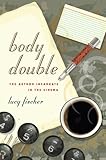Body Double : The Author Incarnate in the Cinema / Lucy Fischer.
Material type: TextPublisher: New Brunswick, NJ : Rutgers University Press, [2013]Copyright date: ©2013Description: 1 online resource (288 p.) : 41 photographsContent type:
TextPublisher: New Brunswick, NJ : Rutgers University Press, [2013]Copyright date: ©2013Description: 1 online resource (288 p.) : 41 photographsContent type: - 9780813554488
- 9780813554501
- 791.43/657 23
- PN1996 .F4553 2012
- online - DeGruyter
- Issued also in print.
| Item type | Current library | Call number | URL | Status | Notes | Barcode | |
|---|---|---|---|---|---|---|---|
 eBook
eBook
|
Biblioteca "Angelicum" Pont. Univ. S.Tommaso d'Aquino Nuvola online | online - DeGruyter (Browse shelf(Opens below)) | Online access | Not for loan (Accesso limitato) | Accesso per gli utenti autorizzati / Access for authorized users | (dgr)9780813554501 |
Browsing Biblioteca "Angelicum" Pont. Univ. S.Tommaso d'Aquino shelves, Shelving location: Nuvola online Close shelf browser (Hides shelf browser)

|

|

|

|

|

|

|
||
| online - DeGruyter Abandoning the Black Hero : Sympathy and Privacy in the Postwar African American White-Life Novel / | online - DeGruyter Haskalah : The Romantic Movement in Judaism / | online - DeGruyter The Case That Never Dies : The Lindbergh Kidnapping / | online - DeGruyter Body Double : The Author Incarnate in the Cinema / | online - DeGruyter Visible Writings : Cultures, Forms, Readings / | online - DeGruyter Land of Smoke and Mirrors : A Cultural History of Los Angeles / | online - DeGruyter Women on Ice : Methamphetamine Use among Suburban Women / |
Frontmatter -- Contents -- Acknowledgments -- Introduction: The Screen Author - Wanted: Dead or Alive -- 1. Typecasting the Author -- 2. Beyond Adaptation: The Writer as Filmmaker -- 3. The Author at the Dream Factory: The Screenwriter and the Movies -- 4. The Authoress: Textuality as Sexuality -- 5. Writing Pain: The Infirm Author -- 6. Cinécriture: Word and Image -- 7. Corpus and Oeuvre: Authorship and the Body -- 8. Stealing Beauty: The Reader, the Critic, and the Appropriation of the Authorial Voice -- Afterword: Signs and Meaning in the Cinema -- Notes -- Filmography -- Bibliography -- Index -- About the author
restricted access online access with authorization star
http://purl.org/coar/access_right/c_16ec
Body Double explores the myriad ways that film artists have represented the creative process. In this highly innovative work, Lucy Fischer draws on a neglected element of auteur studies to show that filmmakers frequently raise questions about the paradoxes of authorship by portraying the onscreen writer. Dealing with such varied topics as the icon of the typewriter, the case of the writer/director, the authoress, and the omnipresent infirm author, she probes the ways in which films can tell a plausible story while contemplating the conditions and theories of their making. By examining many forms of cinema, from Hollywood and the international art cinema to the avant-garde, Fischer considers the gender, age, and mental or physical health of fictionalized writers; the dramatized interaction between artists and their audiences and critics; and the formal play of written words and nonverbal images. By analyzing such movies as Adaptation,Diary of a Country Priest, Naked Lunch, American Splendor, and Irezumi, Fischer tracks the parallels between film author and character, looking not for the creative figure who stands outside the text, but for the one who stands within it as corporeal presence and alter-ego.
Issued also in print.
Mode of access: Internet via World Wide Web.
In English.
Description based on online resource; title from PDF title page (publisher's Web site, viewed 30. Aug 2021)


